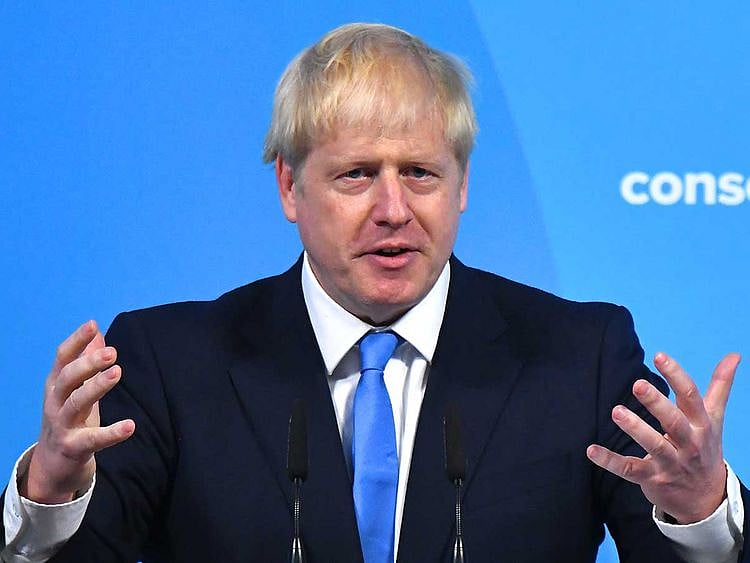British Prime Minister Boris Johnson seems trapped in a political vice constructed by the Remainer Parliament. Having lost his Commons majority and been savaged by the Supreme Court, he now faces the grim duty of applying to the European Union (EU) for a further delay to Brexit unless he either resigns or swiftly secures a deal.
The former option would be a disaster, opening the way for a hostile caretaker government. The latter step appears increasingly unlikely. Not only have negotiations in Brussels stalled, but moderate Labour MPs would be reluctant to help him, particularly after the explosive scenes seen in the parliament.
Yet, Tory optimists cling to the belief that there is route to salvation, even if Johnson is forced by parliament to sign up for an extension to Article 50. This lies in an appeal to the country through a general election, which could sweep him back to power on a robust Brexit platform.
The theory goes that in such a campaign, he would be able to exploit the public mood of disillusion with the chronic failure of Westminster to implement the referendum result. According to this upbeat narrative, Boris’s popularity will be all the greater if he makes a pact with Nigel Farage’s Brexit Party, fighting jointly on the theme of the British people versus the establishment.
But the high hopes invested in an imminent general election could be badly misplaced. The idea of an impending surge for the Tories may be nothing more than wishful thinking. Indeed, for all the government’s demands for an early contest, the Conservatives are in a precarious position.
Two opinion polls this week put Johnson’s party on just 27 per cent, with barely any lead over the opposition. Theresa May went into the 2017 General Election with a lead of over 20 points, which soon evaporated under the pressure of events. Boris is of course a far better communicator and showman that May, but even his charismatic showmanship may not be enough.
Nor is there much evidence of a growing public clamour against the elite, contrary to all the eager rhetoric about a wave of indignation spreading across the country. One survey yesterday showed that 60 per cent of voters backed the Supreme Court’s decision, compared to 29 per cent who were opposed.
The same is true of a no-deal Brexit, the cherished holy grail of fundamentalist Leavers. All opinion polls have revealed that this policy commands the support of less than a third of the electorate, so it hardly represents “the will of the people”.
The case for an imminent Tory victory really breaks down when the mechanics of an election are analysed, for it is hard to see where there will be a single gain for the government.
In reality, Johnson’s party could face heavy losses. There are no fewer than 68 Conservative constituencies which could fall on a swing of less than four per cent, while 22 marginals have majorities of less than 1,000. The Tories could face a wipeout in Scotland at the hands of the nationalists, especially because their popular former leader Ruth Davidson has now resigned.
Further south, the Liberal Democrats are advancing once more after years of retreat. With its clear stance on Brexit, Jo Swinson’s party is now a huge threat in the affluent Tory suburbs across the country. Conservative strategists believe that losses to the Liberal Democrats and the Scottish Nationalists can be offset by encroachment into the Labour heartlands that backed Leave in the referendum.
After all, it is estimated that around five million Labour voters supported Brexit in 2016, a rich electoral pool from which the Tories could draw, helped by discontent over Jeremy Corbyn’s far-Left leadership.
But this ignores the fact that the Labour vote has powerful, tribal solidarity. “I’ve been Labour all my life,” is the phrase that canvassers will constantly hear during an election. In 2017, there was excitable talk about a massive switch of Labour voters to the Tories in the north and the midlands, but the change never materialised.
Even in the Tory landslide of 1983, when Michael Foot’s party sank to just 27.6 per cent of the vote, Labour still won over 200 Parliamentary seats.
The prospects for the Tories are even worse if Johnson has to break his solemn pledge and ask the EU to delay our departure beyond the end of October. In such humiliating circumstances, millions of votes will be siphoned off by the Brexit party, Labour and the rest of the opposition.
No amount of populist rhetoric could conceal the extent of the failure. One opinion poll last week showed that, in such an eventuality, Labour would have a three-point lead over the Tories.
Johnson will have to find another escape route from the vice, preferably by urgently concentrating his energies on a workable deal. At present, thoughts of glory at the ballot box belong to the realm of fantasy.
Leo McKinstry is a top British journalist, historian and author.
Sign up for the Daily Briefing
Get the latest news and updates straight to your inbox
Network Links
GN StoreDownload our app
© Al Nisr Publishing LLC 2026. All rights reserved.
